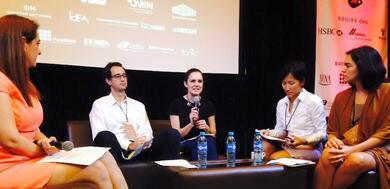
Something New in BOP Housing
By Christy Stickney, author of Many Paths to a Home: Emerging Business Models for Latin America and the Caribbean’s Base of the Pyramid; and Lina Salazar Ortegón, Opportunities for the Majority at the IDB I’m intrigued by FOMEPADE, a rising star in Mexico’s financial scene. Conceived by microfinance veteran Juan José Gutiérrez Chapa (a founding partner of Banco Compartamos) to provide quality housing to underserved markets, FOMEPADE launched in 2012 a housing loan program that incorporates housing providers into a unique value chain for the families at the base of the pyramid (BOP). FOMEPADE’s promising ventures in affordable housing for the BOP offer evidence that new players and business models are emerging, forging inroads into BOP housing markets in Latin America and the Caribbean (LAC).

Renewable Energy: Approaching the tipping point
Renewable Energy: Approaching the tipping point Imagine pushing a cumbersome and heavy ball up a steep incline with the goal of arriving at the top and having it roll down the other side by itself to a final destination. The initial time invested and physical strength exerted would seem worthwhile if you could just arrive at the summit – the tipping point. This is oftentimes the feeling in the renewable energy sector in Latin America and the Caribbean (LAC). Although there is increasing activity in renewable projects and frameworks, developers, investors, engineers and others in the relatively nascent industry in LAC seem to be trudging up a hill, sweating and hoping that the industry can soon move itself without assistance. http://vimeo.com/65930811

Technology to access an unexplored market in Peru
Good news for companies and financial institutions interested in tapping into new markets: Peruvians who live at the base of the pyramid (BoP) spent 160 percent more on information and communications technologies (ICT) in 2013 than in 2000 –from US$20 per capita per year to US$52. Currently, four out of ten BoP heads of households use the internet. More than half of them are between 18 and 35 years old. Additionally, 95 percent of the country’s BoP heads of household own a cellphone, and predominantly the younger ones use it to access the internet.

The one thousand and one questions on business ethics
What is an ethical business? Bernardo Toro, an advisor to the Avina Foundation, said it clearly and with humor during the opening ceremony of the Latin America Impact Investing Forum (FLII) which took place in Mérida, México at the end of February: “It is a business that doesn’t prey on people; one that creates real value; one that pays attention to what’s important, not what’s showy.” Simple and to the point.

Three Assumptions You Should Avoid When Working with the BoP
“I like working in something I love, where I receive compliments and I manage my own time,” said Carlos, a 43-year old man, father of two, who earns less than U$360 per month. He was one of the 10 men and women we gathered in Villa El Salvador in Lima, Peru, for a focus group on the consumption preferences of low-income people. His response to the question about the advantages of a formal, stable job made me realize people and organizations (me included) working with those at the base of the pyramid (BoP) tend to make subtle assumptions about this segment of the population – assumptions that impact the effectiveness of our projects to benefit this population.